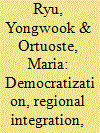| Srl | Item |
| 1 |
ID:
131352


|
|
|
|
|
| Publication |
2014.
|
| Summary/Abstract |
The establishment of the Association of Southeast Asian Nations' (ASEAN) Intergovernmental Commission on Human Rights (AICHR) is extremely puzzling, because many ASEAN members have never been strong supporters of human rights, nor have they been advocates for intervening in the name of human rights. Why did ASEAN members, then, agree to establish the AICHR? We argue that the AICHR is the result of two factors: democratization in key regional countries and the intensifying effort of regional integration in the form of the ASEAN Community project. The former factor engendered key agents for pro-human rights initiatives and set the direction of human rights development within ASEAN. The latter factor weakened the old norms of the ASEAN Way and engendered new regional norms such as good governance and accountability, which were conducive to the development of human rights. It also provided persuasive power based on a shared sense of collective purpose in eliciting agreement from the authoritarian members for the AICHR. We support our argument with the analysis of all ASEAN vision statements and its ministerial meeting statements from 1967 to 2010 as well as our own interviews. The analysis shows that the emergence of new regional norms was closely associated with the development of the ASEAN Community project, and this normative change resulted in a different view of human rights, whose promotion would positively affect regional integration and stability. Our argument suggests a different perspective of a regional human rights mechanism essentially as a regional body reflecting regional norms and values.
|
|
|
|
|
|
|
|
|
|
|
|
|
|
|
|
| 2 |
ID:
133475


|
|
|
|
|
| Publication |
2014.
|
| Summary/Abstract |
Inclusive participation by all states is now taken for granted in many global governance efforts, but this was not always the normal practice. Nineteenth-century multilateralism, embedded in a world of "great powers," actively rejected broad participation, valuing small numbers, hierarchy, and status in coordinating action. Construction of broader participation norms in the late nineteenth and early twentieth centuries was a joint project that owes much to innovations in the Americas and regional norms developed within that group as it organized meetings among the American states. Central to these norms was sovereign equality that, in the American context, entailed universal participation of all American states and voting on a one state-one vote basis at conferences. This article traces the spread of these norms from the Americas to the Hague Conferences of 1899 and 1907, and highlights the varied sources for many of our contemporary multilateral practices in these early events.
|
|
|
|
|
|
|
|
|
|
|
|
|
|
|
|
| 3 |
ID:
142080


|
|
|
|
|
| Summary/Abstract |
Why did ASEAN create a regional human rights body? The 2008 ASEAN Charter includes the “promotion and protection” of human rights among ASEAN’s Principles and Purposes. It also declared that ASEAN would establish a human rights body. This raises an empirical puzzle given the prevailing ASEAN norm of “non-interference in the internal affairs of one another”, which traditionally has meant that human rights records are excluded as a criterion of membership of ASEAN, and as a topic for (official) dialogue. Member states have refrained from publicly criticizing one another in regard to human rights. This article argues that regional norms are shaped by competing perceptions of legitimacy. Members’ interpretations of the legitimacy of ASEAN and its norms as perceived by those outside the region — “external regional legitimacy” — were crucial in shaping the decision to establish a regional human rights body. This article makes the case that more attention should be paid to legitimacy in the study of regional norms.
|
|
|
|
|
|
|
|
|
|
|
|
|
|
|
|